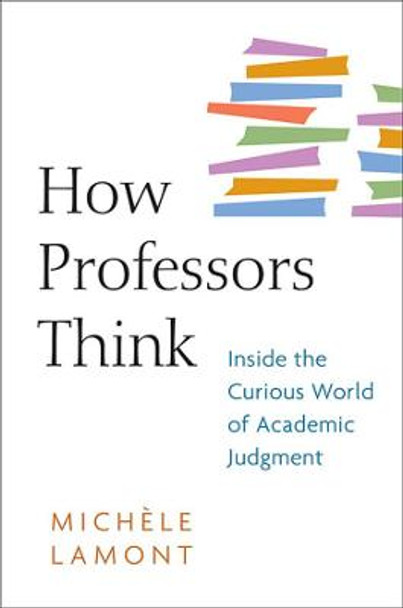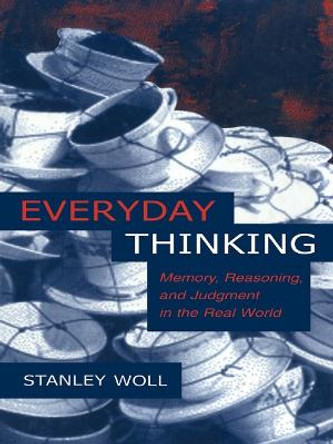Description
Excellence. Originality. Intelligence. Everyone in academia stresses quality. But what exactly is it, and how do professors identify it?
In the academic evaluation system known as "peer review," highly respected professors pass judgment, usually confidentially, on the work of others. But only those present in the deliberative chambers know exactly what is said. Michele Lamont observed deliberations for fellowships and research grants, and interviewed panel members at length. In How Professors Think, she reveals what she discovered about this secretive, powerful, peculiar world.
Anthropologists, political scientists, literary scholars, economists, historians, and philosophers don't share the same standards. Economists prefer mathematical models, historians favor different kinds of evidence, and philosophers don't care much if only other philosophers understand them. But when they come together for peer assessment, academics are expected to explain their criteria, respect each other's expertise, and guard against admiring only work that resembles their own. They must decide: Is the research original and important? Brave, or glib? Timely, or merely trendy? Pro-diversity or interdisciplinary enough?
Judging quality isn't robotically rational; it's emotional, cognitive, and social, too. Yet most academics' self-respect is rooted in their ability to analyze complexity and recognize quality, in order to come to the fairest decisions about that elusive god, "excellence." In How Professors Think, Lamont aims to illuminate the confidential process of evaluation and to push the gatekeepers to both better understand and perform their role.
This fair-minded and reader-friendly book might just help produce the trust, respect, and tolerance necessary for academic community. By closely examining scholarly evaluation and identifying distinctive disciplinary definitions of quality among the humanities and social sciences, Michele Lamont shows that academic culture, far from being a hierarchy declining from supposedly more "rigorous" and demanding disciplines to those less so, is constituted of many different excellencies. -- Thomas Bender, author of Intellect and Public Life A masterpiece. Lamont starts with her greatest accomplishment: a nuanced account of the epistemic cultures that dominate social sciences and humanities. Their differences show the problem of building a culture of discourse in multidisciplinary review, so that committees can decide which standard is best. Lamont breaks new ground in showing how personal preferences, disciplinary, gender, and ethnic diversity, and elitist and populist impulses are incorporated in such decisions. -- Arthur Stinchcombe, author of The Logic of Social Research Professors pride themselves on objectivity, or failing that, fairness to competing views, or failing that, at least the capacity for neutral analysis. But based on her ground-breaking study of peer review, Michele Lamont argues that professorial pride is excessive, that the outcomes of peer review are shaped by institutional mechanics as much as by reason, and that reviewers favor work that looks like their own much more than they realize they do. But Lamont also shows that that reviewers are serious about trying to identify the best proposals and trying to overcome their own biases, and that their commitment to the review process itself makes the outcomes more fair. How Professors Think will be eye-opening for those who run peer review, those who participate in it, and those interested in a sociology of expert judgment. -- Craig Calhoun, Social Science Research Council In this ingenious study, the first of its kind, Michele Lamont opens an important and mysterious black box--how professors arrive at "fair evaluations". Lamont brilliantly shows us not only the interpersonal processes that make review panels work, but also how disciplinary cultures affect academic judgment, and what the political and knowledge consequences are of the way we judge excellence. It will be enlightening for everyone in academia. -- Karin Knorr Cetina, University of Chicago and University of Konstanz All the deans and provosts who fret about their rankings and grant money should read this first hand account of how scholars and social scientists are evaluated in practice. -- Bruno Latour, author of Politics of Nature: How to Bring the Sciences into Democracy
About the Author
Michele Lamont is Robert I. Goldman Professor of European Studies and Professor of Sociology and African and African American Studies at Harvard University.
Reviews
This fair-minded and reader-friendly book might just help produce the trust, respect, and tolerance necessary for academic community. By closely examining scholarly evaluation and identifying distinctive disciplinary definitions of quality among the humanities and social sciences, Michele Lamont shows that academic culture, far from being a hierarchy declining from supposedly more "rigorous" and demanding disciplines to those less so, is constituted of many different excellencies. -- Thomas Bender, author of Intellect and Public Life
A masterpiece. Lamont starts with her greatest accomplishment: a nuanced account of the epistemic cultures that dominate social sciences and humanities. Their differences show the problem of building a culture of discourse in multidisciplinary review, so that committees can decide which standard is best. Lamont breaks new ground in showing how personal preferences, disciplinary, gender, and ethnic diversity, and elitist and populist impulses are incorporated in such decisions. -- Arthur Stinchcombe, author of The Logic of Social Research
Professors pride themselves on objectivity, or failing that, fairness to competing views, or failing that, at least the capacity for neutral analysis. But based on her ground-breaking study of peer review, Michele Lamont argues that professorial pride is excessive, that the outcomes of peer review are shaped by institutional mechanics as much as by reason, and that reviewers favor work that looks like their own much more than they realize they do. But Lamont also shows that that reviewers are serious about trying to identify the best proposals and trying to overcome their own biases, and that their commitment to the review process itself makes the outcomes more fair. How Professors Think will be eye-opening for those who run peer review, those who participate in it, and those interested in a sociology of expert judgment. -- Craig Calhoun, Social Science Research Council
In this ingenious study, the first of its kind, Michele Lamont opens an important and mysterious black box--how professors arrive at "fair evaluations". Lamont brilliantly shows us not only the interpersonal processes that make review panels work, but also how disciplinary cultures affect academic judgment, and what the political and knowledge consequences are of the way we judge excellence. It will be enlightening for everyone in academia. -- Karin Knorr Cetina, University of Chicago and University of Konstanz
All the deans and provosts who fret about their rankings and grant money should read this first hand account of how scholars and social scientists are evaluated in practice. -- Bruno Latour, author of Politics of Nature: How to Bring the Sciences into Democracy
Balanced, informative and largely persuasive. -- Adam Kuper * Times Literary Supplement *
How Professors Think: Inside the Curious World of Academic Judgment gives the reader keen insight into the decision-making process behind the awarding of prestigious fellowships. Lamont's book is an enjoyable read, even a bit of a page turner at times...It is a "must-read" for graduate students and new professors. -- Marybeth Gasman * Academe *
Awards
Nominated for Robert K. Merton Book Award 2010 and Society for the Study of Social Problems C. Wright Mills Award 2009 and Mary Douglas Prize 2010 and Ludwik Fleck Prize 2010 and Pierre Bourdieu Award 2010 and Frederic W. Ness Book Award 2011 and Pierre Bourdieu Award 2011 and Robert K. Merton Book Award 2011 and Mary Douglas Prize 2009.
Book Information
ISBN 9780674057333
Author Michele Lamont
Format Paperback
Page Count 336
Imprint Harvard University Press
Publisher Harvard University Press






